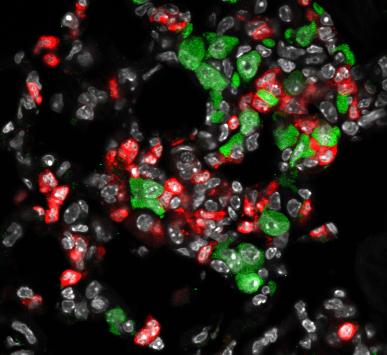Dr Luigi Ombrato awarded Cancer Research UK grant to understand how the seeds of secondary tumours grow
Congratulations to Dr Luigi Ombrato who has been awarded a £744,000 Career Establishment Award from Cancer Research UK (CRUK). The funding will support Dr Ombrato’s work investigating the earliest stages of cancer spread at Barts Cancer Institute (BCI), Queen Mary University of London.
By understanding how cancer cell pioneers make a home for themselves in new tissues and interact with the immune system, Dr Ombrato aims to reveal new opportunities to stop the growth of secondary tumours before they can take root. We spoke to Dr Ombrato to learn more about his scientific journey and how the unique community in our Centre for Tumour Microenvironment is supporting him and his team to carry out their innovative work.
Tell us about your journey into science.
I wasn't born a cancer biologist. I originally studied Biotechnology in Naples, Italy and pursued my PhD at the Telethon Institute of Genetics and Medicine (TIGEM), which is dedicated to studying rare genetic diseases. I then moved to the Centre for Genomic Regulation in Barcelona, Spain, where I studied how we can reprogramme cells to change their cell type.

I took my first steps into cancer research as a postdoc, when I came to the UK and joined the London Research Institute. A few years after I joined, we all moved into the newly built Francis Crick Institute. In Dr Ilaria Malanchi's lab, I studied how cancer cells spread and take root in new areas of the body (the process of metastasis) and how they survive in their new distant, unfamiliar environment and grow into secondary tumours.
"If we are to treat metastasis, it’s crucial that we understand how secondary tumours create an environment where they can thrive."
— Dr Luigi Ombrato
Why is studying how metastases form an important challenge?
Nowadays, people with cancer usually die from metastasis, not from their primary tumour. If we are to treat metastasis, it’s crucial that we understand how secondary tumours create an environment where they can thrive. But what exactly happens when cancer spreads to other organs and how it takes root remains very obscure. The initial pioneer cells that seed new tumours are extremely challenging to detect and study. For example, in breast cancer, cancer cells escape into the blood stream where they circulate and often end up in the lungs. But only 10-100 cancer cells might be hidden among millions of lung cells. So the question is: how do we find them to study them?
At the Crick, I developed a new technique that genetically modifies tumour cells to secrete a red fluorescent protein. When these cells metastasize into a new environment, neighbouring cells take up this protein, illuminating them and revealing the location of the early tumour microenvironment. Using this tool, I was able to study how cancer cells reprogramme neighbouring lung epithelial cells to become more stem-cell like. We distributed this technique with the help of CRUK’s cancertools.org biorepository, and now more than 300 laboratories have used it worldwide.

What drew you to the Barts Cancer Institute and our Centre for Tumour Microenvironment?
For me, the BCI was an obvious choice to take the next step and start my own lab. I was looking for a place with a strong interest in the tumour microenvironment. Here we have a whole centre focussed on this area, with complementary expertise in topics such as immunology, blood vessel growth and the extracellular matrix, giving us a deep pool of knowledge to draw on. This is unique: I haven't seen an integrated community dedicated to researching the tumour microenvironment like this anywhere else. There is also a strong sense of community and collaboration at the BCI – it's like a cancer research village in the centre of London.
What research questions will the new CRUK grant enable you to tackle?
In recent years, the rise of immunotherapies has benefitted a great number of patients. Most current immunotherapies target T cells, helping them to recognise and kill tumour cells. But there's a huge potential for new types of immunotherapy that target different cells and biological processes – including metastasis.
The new CRUK grant will be instrumental in supporting my lab's research into how immune cells contribute to metastasis. I'm particularly interested in the role of myeloid cells such as neutrophils, a part of our innate immune system that is very abundant in the early stages of metastasis formation. We think that the way these cells communicate with one another is critical to creating a microenvironment that supports the tumour's growth.
"Ultimately, our aim is to identify ways of disrupting these immune interactions, which could provide a much-needed targeted way to impair metastasis formation."
— Dr Luigi Ombrato
The first step is to better understand the dynamics of these biological processes, and how they control cancer disease progression. But ultimately, our aim is to identify ways of disrupting these immune interactions, which could provide a much-needed targeted way to impair metastasis formation.
How are you working to translate your lab research into the clinic?
We've been working with the biotech company LIfT Biosciences – one of the first biotech companies to focus on creating immunotherapies that target neutrophils. This collaboration emerged out of a virtual industry networking day hosted by our Centre for Tumour Microenvironment in 2020. I began speaking to the CEO, and our partnership grew from there, with the help of Queen Mary's business development team. Last year, we also received a Knowledge Transfer Partnership grant from UKRI, which is funding a postdoc who works between my lab and LIfT, with the aim of accelerating the progress of this new type of therapy to the clinic. The CRUK grant will help us to build on this momentum.
Category: General News, Grants & Awards

No comments yet